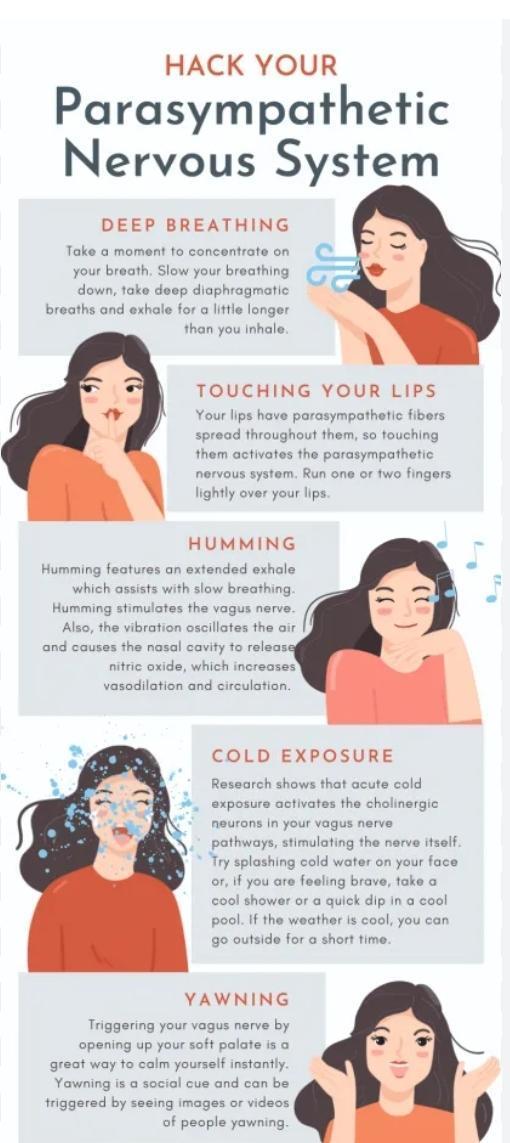The Vegus Nerve and How To Regulate Your Parasympathetic Nervous Systems
The Vegus Nerve and How To Regulate Your Parasympathetic Nervous Systems
Hello, curious learners, to an enlightening exploration of the vagus nerve and its role in regulating the parasympathetic nervous system. In this educational article, we will delve into the science behind these fascinating components of our body's autonomic nervous system. Understanding the vagus nerve and learning how to regulate the parasympathetic nervous system can have profound effects on our well-being and overall health. So, let us embark on this journey of knowledge and discover effective techniques to harness the power of the parasympathetic nervous system.
The Vagus Nerve: An Overview:
The vagus nerve, also known as the tenth cranial nerve, is the longest and most complex nerve in the human body. It originates in the brainstem and branches out to various organs throughout the body, including the heart, lungs, digestive system, and more. The vagus nerve plays a critical role in the parasympathetic nervous system, which is responsible for promoting rest, relaxation, and the body's self-healing processes.
The Parasympathetic Nervous System: A Gateway to Relaxation:
The parasympathetic nervous system acts as a counterbalance to the sympathetic nervous system, which triggers the body's fight-or-flight response. When the parasympathetic nervous system is activated, it promotes a state of calmness, relaxation, and restoration. This activation allows the body to conserve energy, lower heart rate and blood pressure, improve digestion, and enhance overall well-being.
Regulating the Parasympathetic Nervous System:
Now, let's explore some scientifically proven techniques that can help regulate the parasympathetic nervous system and promote relaxation:
- Deep Breathing Exercises:
Deep breathing exercises, such as diaphragmatic breathing or "belly breathing," can stimulate the vagus nerve and activate the parasympathetic nervous system. By taking slow, deep breaths, you engage the diaphragm, sending signals to the brain that trigger relaxation responses. Aim for extended exhales, as they are particularly effective in calming the nervous system. - Meditation and Mindfulness Practices:
Engaging in regular meditation and mindfulness practices can have profound effects on the parasympathetic nervous system. Scientific studies have shown that these practices help reduce stress, lower blood pressure, and enhance overall well-being. Find a quiet space, focus on your breath or a specific meditation technique, and allow your mind to enter a state of calmness and tranquility. - Engaging in Relaxation Activities:
Engaging in activities that bring you joy and relaxation can activate the parasympathetic nervous system. Whether it's reading a book, taking a warm bath, listening to soothing music, or spending time in nature, find activities that help you unwind and promote a sense of inner peace. Scientific evidence suggests that engaging in pleasurable activities can increase vagal tone, which reflects the activity of the vagus nerve. - Regular Exercise:
Regular physical exercise has been shown to improve vagal tone and enhance the parasympathetic nervous system's function. Engage in activities such as yoga, tai chi, or walking, as they promote relaxation and stimulate the vagus nerve. Aim for at least 30 minutes of moderate exercise most days of the week to experience the benefits. - Social Connections and Emotional Support:
Nurturing social connections and seeking emotional support can positively impact the parasympathetic nervous system. Engaging in meaningful relationships, spending time with loved ones, and seeking support from friends and family can reduce stress levels and promote overall well-being.
Congratulations on expanding your knowledge about the vagus nerve and the parasympathetic nervous system. By understanding these intricate components of our autonomic nervous system and implementing proven techniques, you can regulate the parasympathetic nervous system and promote relaxation, rest, and overall well-being. Remember, scientific evidence supports deep breathing exercises, meditation and mindfulness practices, engaging in relaxation activities, regular exercise, and nurturing social connections as effective ways to stimulate the vagus nerve and activate the parasympathetic nervous system. Embrace these techniques and embark on a journey of self-care and relaxation, allowing your body to thrive in a state of balance and harmony.
Disclaimer: The information provided in this article is for educational purposes only and should not replace professional medical advice. If you have specific health concerns or conditions, please consult with a healthcare professional for personalized guidance tailored to your needs.
Be the first to post a message!
